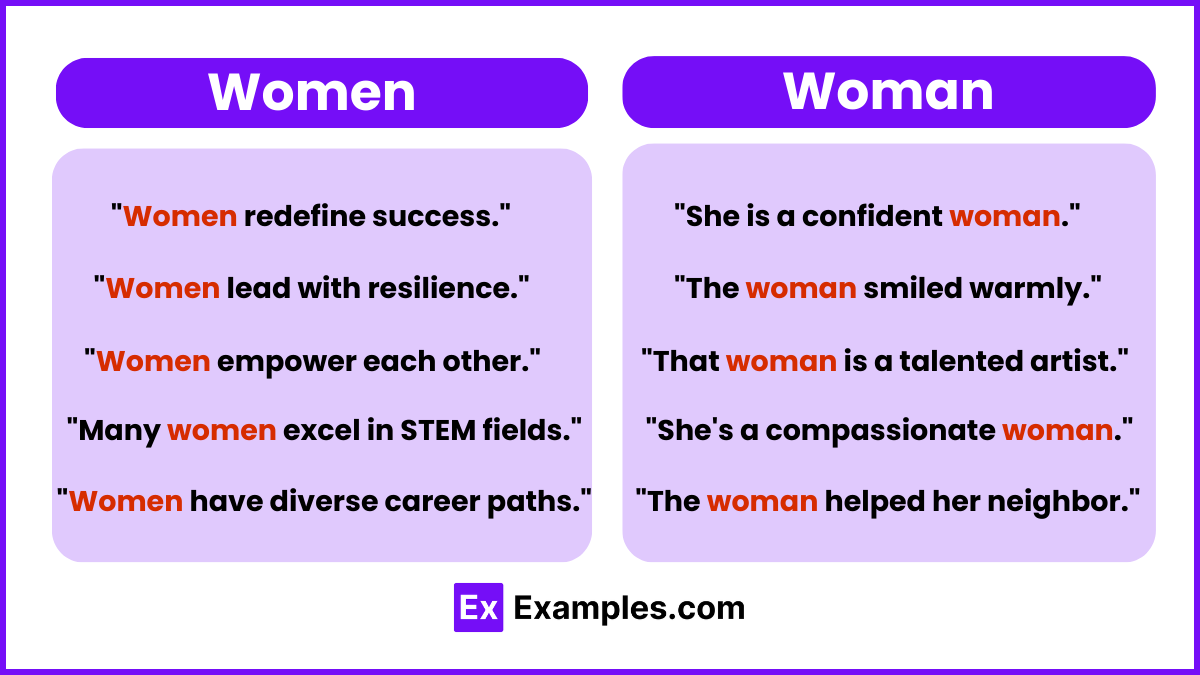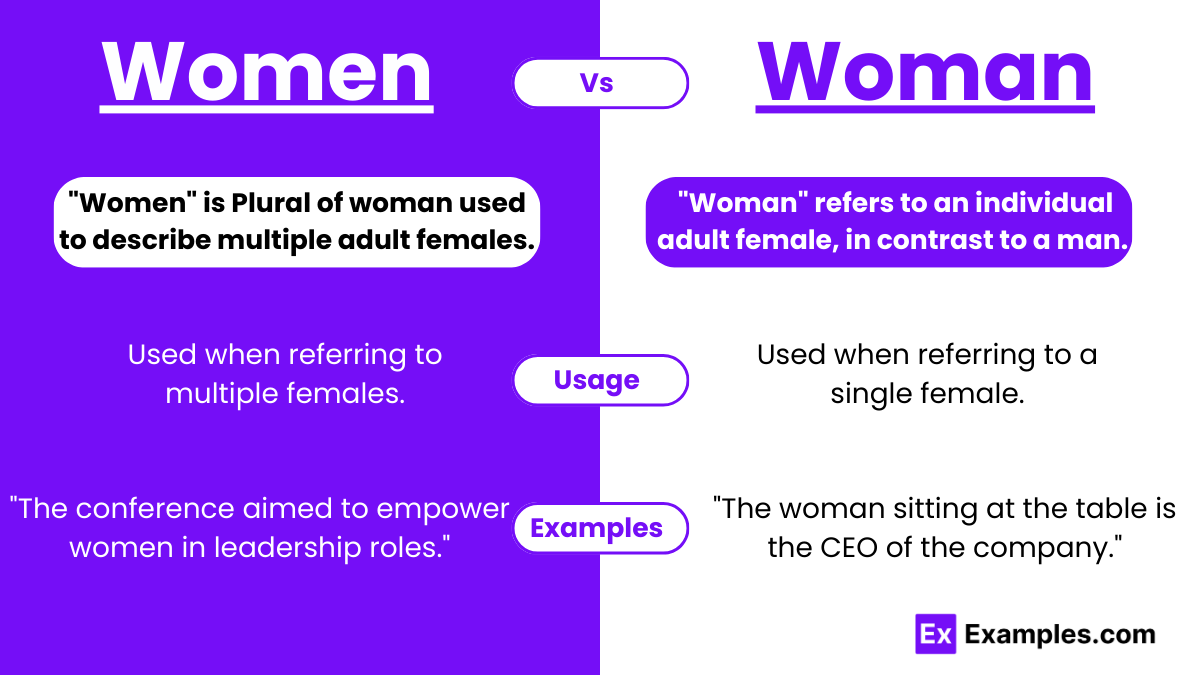Women vs Woman – Meanings, Difference, Usage, Examples, Pronunciation
Understanding the difference between ‘women’ and ‘woman’ is crucial as they represent distinct concepts despite their similar spellings. While both are nouns referring to females, they are used in different contexts and carry different meanings. ‘Women’ is the plural form of ‘woman,’ indicating multiple females, whereas ‘woman’ refers to an individual adult female. Although they share a linguistic root, their usage and implications diverge significantly.
Women and Woman – Meanings
“Woman” and “women” are both nouns used to refer to females their usage differs
- Woman: This term refers to an individual adult female, typically in contrast to a man. It represents the singular form of the noun.
- Women: “Women” is the plural form of “woman,” used to describe multiple adult females.
Summary
“Woman” This refers to an individual adult female, used in singular form. “Women” This is the plural form of “woman,” indicating multiple adult females. So, “woman” is singular, while “women” is plural.
How to Pronounce Women and Woman
- Woman: Pronounced as /ˈwʊmən/ (WOOM-uhn).
- Women: Pronounced as /ˈwɪmɪn/ (WIH-min).
Differences between Women and Woman
| Feature | Women | Woman |
|---|---|---|
| Plurality | Plural form of “woman” | Singular form of the word “woman” |
| Subject | Refers to more than one adult female | Refers to a single adult female |
| Usage | Used when referring to multiple females | Used when referring to a single female |
| Grammatical | Noun in plural form | Noun in singular form |
| Adjective | “Many women attended the conference.” | “She is a strong woman.” |
| Possessive | “The women’s rights movement.” | “That woman’s achievements are remarkable.” |
| Demonstrative | “These women are talented.” | “This woman deserves recognition.” |
How to Remember the Difference between Women and Woman
- Woman: “Woman” has two syllables and refers to a singular female. Think of it as “wo-man,” with “wo” indicating one woman.
- Women: “Women” has three syllables and refers to multiple females. Think of it as “wo-men,” with “wo” indicating more than one woman.
How to Use Women and Woman

Usage of Women
- Group References: Use “women” when referring to a collective of adult females.
- Demographic Analysis: In research or statistical contexts, analyze data involving groups of females using “women.”
- Social Discussions: Discuss societal issues or topics related to females using the term “women.”
- Community Representation: “Women” is used to represent and advocate for the interests, rights, and issues relevant to the female population as a whole.
Usage of Woman
- Individual Identification: Use “woman” when referring to a specific adult female individual.
- Character Descriptions: In literature or storytelling, describe female characters as “woman.”
- Everyday Language: Employ “woman” in daily conversations to refer to an individual female.
- Professional Context: In professional settings, “woman” is used to refer to female colleagues, employees, or professionals, emphasizing gender neutrality and inclusivity.
Examples – Women and Woman

Women Examples
- The conference aimed to empower women in leadership roles.
- Women around the world continue to strive for equality.
- In many cultures, women play a vital role in family and community life.
- The organization focuses on providing support for marginalized women.
- The survey analyzed the perspectives of women in STEM fields.
Woman Examples
- She is a remarkable woman who has achieved great success in her career.
- The woman sitting at the table is the CEO of the company.
- As a woman, she faces unique challenges in the workplace.
- Every woman deserves equal opportunities and rights.
- She’s a woman of integrity and strength.
Synonyms
| Noun | Synonyms |
|---|---|
| Woman | Female, lady, girl |
| Women | Females, ladies, girls |
Exercise
- She is a remarkable ________ who has made significant contributions to society.
- The ________ gathered for a conference on gender equality.
- Many ________ face barriers in accessing education and healthcare.
- The ________ in the photograph are smiling happily.
- As a young ________, she dreams of making a difference in the world.
Answers
- woman
- women
- women
- women
- woman
FAQ’S
When should I use women or woman?
Use “woman” when referring to one adult female. Use “women” when referring to more than one adult female.
Is the woman singular or plural?
“Woman” is singular, referring to one adult female. “Women” is plural, referring to more than one adult female.
Why do some people say women like woman?
Some dialects or accents may not clearly distinguish between “woman” and “women,” causing them to sound similar in pronunciation.
Why is woman and women pronounced differently?
The pronunciation difference stems from English language conventions. “Woman” ends with an unstressed ‘uh’ sound, while “women” ends with an ‘ih’ sound.
Why do Kiwis say woman instead of women?
Certain dialects, like New Zealand English (Kiwis), might exhibit variations in pronunciation. They may pronounce “women” similar to “woman” due to regional linguistic influences.


